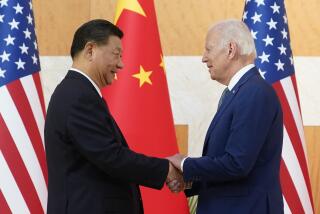Bush’s Asia Tour ‘a Victory of Low Expectations’
- Share via
BEIJING — He came and he saw, but President Bush didn’t conquer much new turf on his six-day swing through Asia.
Reflecting a different strategy from the style of the Clinton White House, however, the Bush administration didn’t set out to produce breakthroughs, new agreements or dramatic “deliverables” during summits in China, South Korea and Japan, according to a senior administration official.
Prospects for any major development on the three-nation tour were also limited by the fact that two of the leaders Bush visited were lame ducks and the third might have problems holding on to power. Chinese President Jiang Zemin is set to step down next year. South Korea is holding elections in December to replace its president, Kim Dae Jung, who can’t run again. And in Japan, Prime Minister Junichiro Koizumi’s popularity has plummeted recently.
So, although the scorecard looks decidedly mixed, the White House considers last week’s tour to have been a success. Before leaving here Friday after a sightseeing stop at the Great Wall, Bush declared the trip “fantastic, beautiful.”
In reality, it was more like “a victory of low expectations,” concluded Bates Gill, a senior fellow at the Brookings Institution in Washington.
In Beijing, the president didn’t get an agreement on limiting the proliferation of weapons of mass destruction--his top priority with China and a central tenet of his foreign policy worldwide.
But Bush did expand and deepen a key relationship, most notably by establishing contact with the next generation of political leadership in China and with the country’s youth. The most tangible of his achievements might prove to be arranging a visit to the U.S. by Hu Jintao, China’s vice president and the heir apparent to Jiang.
“The visit was about relationship-building above everything else and investing in the young dot-Communists,” said Min Xin Pei, a senior fellow at the Carnegie Endowment for International Peace in Washington.
So, although the administration’s top goal remains elusive, there was some balance in the outcome of the China stop.
In Seoul, the onetime momentum behind Nobel Peace Prize laureate Kim’s “sunshine policy,” an effort to reach out to North Korea and eventually reunify the Korean peninsula, appears to have thoroughly dissipated, in part because of Bush’s tough talk on North Korea. Since his State of the Union address, Bush has repeatedly called the regime in Pyongyang, the North’s capital, one of three in an “axis of evil.”
Bush did express his willingness to engage in dialogue with the North. But whereas the Clinton administration was negotiating a deal under which the North would end its production and distribution of ballistic missiles, Bush added the issue of North Korean troop withdrawal.
“The president showed that muscular rhetoric, speaking in morally clear tones, is not incompatible with reaching out to the North Korean regime,” the senior administration official said.
The reaction in both halves of the divided peninsula didn’t bode well for any imminent development, however.
North Korea lashed out at Bush in a Foreign Ministry statement Friday that dismissed him as a “politically backward child.” The official Korean Central News Agency on Saturday described the presidential visit as “a war junket to finally examine the preparations for a war on the spot.” And it called Bush’s comments about the North “the gangster-like logic of a typical rogue and a kingpin of terrorism.”
The press in the South, for its part, painted a gloomy picture. Some in South Korea actually saw the visit as a setback.
“Bush may have no preconditions for dialogue with North Korea, but he doesn’t sound like a man trying seriously to lure an adversary to the negotiating table,” said the editor of the English-language Joong Ang Ilbo in a stinging column.
“That’s it. Rest in peace, sunshine policy. Kim Dae Jung is finally a sure-enough lame duck,” the newspaper column went on. The party leading the polls has been deeply critical of Kim’s policy.
So the Korean leg of the tour, as anticipated, produced the least.
In Tokyo, finally, the president’s polite public support of Koizumi’s reform efforts was at least initially perceived as inadequate to turn around a deeply troubled economy--or prevent deeper problems.
U.S. officials insisted that a much firmer message was delivered--and accepted--in private: to spur greater movement on stalled reforms.
“Because of the nature of the relationship, we were able to speak clearly, but we chose to do that in private. It doesn’t help our interests to deliberately weaken or undercut those who will have to institute those reforms,” the senior administration official said.
The sensitivity of the Japanese market to American input was reflected in a brief wave of panic that sent the yen into decline when Bush mistakenly said he had discussed “devaluation,” rather than “deflation,” with Koizumi. The currency popped back up as soon as the White House issued a clarification.
“Bush put too much emphasis on security and not on the economy, which is the real issue. The falling stock market, the bond market and the bad loan issue should have been addressed years ago. That’s the really urgent matter,” said Atsuo Mihara, an independent economic analyst.
“Before President Bush came, the Japanese market really expected that he would put pressure on Japan to look at the economic problems seriously. Now we’ll have to wait for a crisis.”
So the effect of the Japan stop is still to be determined.
The administration said the imminent leadership turnovers in at least two of his destinations didn’t affect talks.
En route home, Secretary of State Colin L. Powell said: “It’s just the way it is in this world. People turn over, and you have to deal with the leaders that are there.”
*
Times staff writer Mark Magnier in Tokyo contributed to this report.
More to Read
Sign up for Essential California
The most important California stories and recommendations in your inbox every morning.
You may occasionally receive promotional content from the Los Angeles Times.













